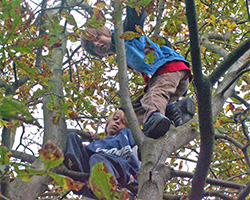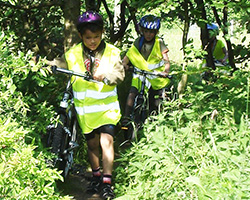Do children with ADHD benefit from nature?
Does a dose of nature have the same effect as a dose of medication? Among other things, a new PhD project seeks to investigate whether time in nature can be an effective supplementary treatment for children with ADHD. The project is supported by TrygFonden.

Photo: Malene Bendix
There is a tremendous interest in finding ways to improve the quality of life for people with ADHD, as well as ways to prevent the disorder from developing in children without it.
Numerous studies have shown that time spent in nature can improve the mental health of children. A new PhD project at the University of Copenhagen’s Centre for Outdoor Life and Nature seeks to compare the effect of time spent in nature with pharmacological treatments for children with ADHD. The project will also investigate the longer-term effects of school days with and without outdoor activity, both in relation to children with and without ADHD.
Children’s brains are hard at work
The force behind the project is Matthew Peter Stevenson, a master’s graduate in psychology from the University of Otago in New Zealand, whose thesis focused on the mental processes of children with ADHD. Throughout his studies, he has been interested in how nature can improve the mental processes that influence our ability to pay attention and engage in appropriate action.
Children today are less likely to play outside than previous generations. At the same time, children’s brains need to work harder than ever to deal with the amount of technology and information they are exposed to,” says Stevenson.
It has been shown that regular activity in natural environments improves concentration levels in children with ADHD, but we do not yet know if this can be applied in practice, within the context of a typical school day, or whether these improvements are lasting.
Any result is worthwhile
“I hope that my project is able to provide practical insights into how outdoor education and outdoor environments, such as the forest and nature, can help to improve the behavioural and cognitive performance of children with and without ADHD. At the same time, I hope to compare “a dose of nature” with “a dose of medication” in order to investigate whether outdoor experiences can be used as a treatment or supplementary treatment,” says Matthew Peter Stevenson.
Value is also to be gained should the project’s hypothesis come up short, Stevenson adds. “We can also help to eliminate false hopes of the families and individuals who suffer from ADHD, and challenge the perception that nature can be a useful element within the educational context.”
 TEACHOUT is TrygFonden’s outdoor education research project. According to Merete Konnerup, who heads up Trygfonden’s effort in this area, “the connection between physical activity and learning readiness is one of our strategic priorities. We believe that it is important to study various efforts, and find out what works.”
TEACHOUT is TrygFonden’s outdoor education research project. According to Merete Konnerup, who heads up Trygfonden’s effort in this area, “the connection between physical activity and learning readiness is one of our strategic priorities. We believe that it is important to study various efforts, and find out what works.”
Contact: Matthew Peter Stevenson, mps@ign.ku.dk, 35335461
| Facts |
|
The PhD project is a collaboration between the Centre for Outdoor Life and Nature at the Department of Geosciences and Natural Resources Management at the University of Copenhagen; the Danish School of Education at Aarhus University; Steno Health Promotion Centre, at the Steno Diabetes Center; as well as the Department of Psychology, University of Otago, New Zealand. The project supervisors are Andreas Bergsted, of the Department of Geosciences and Natural Resource Management, and Peter Bentsen, senior researcher at the Steno Diabetes Center - who is with the TEACHOUT project group, as well as Theresa Schilhab ,associate professor at the Danish School of Education at Aarhus University. |
Topics
Related News
Contact
Matthew Peter Stevenson
PhD student
Email: mps@ign.ku.dk
Phone: +45 35 33 45 61
Anette Ketler
Communications Consultant
E-mail: ketler@ign.ku.dk
Phone: 60 81 64 92
